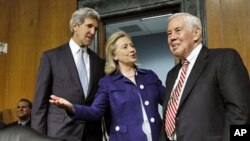Secretary of State Hillary Clinton told Senators that President Barack Obama’s decision to withdraw 33,000 American troops from Afghanistan by the end of next summer was a “tough call” that strikes the right balance amid competing interests. At a Senate hearing, Clinton heard complaints from members of both parties about the level of U.S. spending for Afghanistan.
Clinton was widely reported to have sided with U.S. military chiefs in urging a more cautious withdrawal policy.
But in Senate testimony, she said she fully supports the terms announced late Wednesday by the president, saying it was a “tough call” amid competing advice from members of his national security team.
“It will not surprise you that the views range across the spectrum about what should be done and what should not be done. But I think that the president, with his decision, has hit the mark. He has answered what is a very legitimate concern, not only of this Congress but of the American public, that this has been a very long conflict for the United States,” she said.
Members of the Senate Foreign Relations Committee told Clinton while they supported the U.S. decision to intervene in Afghanistan in 2001, the level of commitment now is disproportionate in terms of other foreign policy interests, and the need to cut the U.S. budget deficit.
The ranking committee Republican, Indiana Senator Richard Lugar, urged the Obama administration to more narrowly define its goals in Afghanistan, and to recognize the sources of threats to U.S. interests have migrated elsewhere during the past decade.
“Administration officials have testified that Yemen is the most likely source of a terrorist attack against American interests in the short term. Further we know that al-Qaida has a far more significant presence in Pakistan that in Afghanistan. To the extent that our purpose in Afghanistan is to confront the global terrorist threat, we should be refocusing resources on Pakistan, Yemen, Somalia, parts of North Africa and other locations,” Lugar said.
Democratic Senator Dick Durbin said the United States is expending the lives of hundreds of troops and $120 billion a year on a conflict less than critical to its strategic interests.
“I have a real skepticism about our mission in Afghanistan at this moment. I do not have great confidence in the leadership in Afghanistan, either in its competence or its honesty. I worry about the money that we are shoveling into this country in sums that are unimaginable in this poor and under-developed country,” Durbin said.
Clinton said the president’s plan will provide the security needed to build self-sufficient local Afghan security forces and facilitate a political solution to the conflict.
She said that would necessarily have to involve Taliban elements who renounce violence and al-Qaida, and she said the United States is involved in tentative outreach to insurgent figures.
“The United States has a broad range of contacts at many levels across Afghanistan and the region that we are leveraging to support this effort, including very preliminary outreach to members of the Taliban. This is not a pleasant business, but a necessary one,” Clinton said.
Clinton said while the U.S. combat role in Afghanistan will end as planned in 2014, NATO, as agreed at its summit last November in Lisbon, will have a “continuing presence” in Afghanistan after that date, the nature of which is being negotiated.
Clinton Defends Obama’s 'Tough Call' on Afghan Troop Levels
